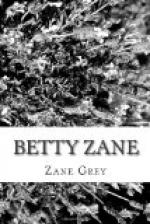CHAPTER VII.
The chilling rains of November and December’s flurry of snow had passed and mid-winter with its icy blasts had set in. The Black Forest had changed autumn’s gay crimson and yellow to the somber hue of winter and now looked indescribably dreary. An ice gorge had formed in the bend of the river at the head of the island and from bank to bank logs, driftwood, broken ice and giant floes were packed and jammed so tightly as to resist the action of the mighty current. This natural bridge would remain solid until spring had loosened the frozen grip of old winter. The hills surrounding Fort Henry were white with snow. The huge drifts were on a level with Col. Zane’s fence and in some places the top rail had disappeared. The pine trees in the yard were weighted down and drooped helplessly with their white burden.
On this frosty January morning the only signs of life round the settlement were a man and a dog walking up Wheeling hill. The man carried a rifle, an axe, and several steel traps. His snow-shoes sank into the drifts as he labored up the steep hill. All at once he stopped. The big black dog had put his nose high in the air and had sniffed at the cold wind.
“Well, Tige, old fellow, what is it?” said Jonathan Zane, for this was he.
The dog answered with a low whine. Jonathan looked up and down the creek valley and along the hillside, but he saw no living thing. Snow, snow everywhere, its white monotony relieved here and there by a black tree trunk. Tige sniffed again and then growled. Turning his ear to the breeze Jonathan heard faint yelps from far over the hilltop. He dropped his axe and the traps and ran the remaining short distance up the hill. When he reached the summit the clear baying of hunting wolves was borne to his ears.
The hill sloped gradually on the other side, ending in a white, unbroken plain which extended to the edge of the laurel thicket a quarter of a mile distant. Jonathan could not see the wolves, but he heard distinctly their peculiar, broken howls. They were in pursuit of something, whether quadruped or man he could not decide. Another moment and he was no longer in doubt, for a deer dashed out of the thicket. Jonathan saw that it was a buck and that he was well nigh exhausted; his head swung low from side to side; he sank slowly to his knees, and showed every indication of distress.
The next instant the baying of the wolves, which had ceased for a moment, sounded close at hand. The buck staggered to his feet; he turned this way and that. When he saw the man and the dog he started toward them without a moment’s hesitation.
At a warning word from Jonathan the dog sank on the snow. Jonathan stepped behind a tree, which, however, was not large enough to screen his body. He thought the buck would pass close by him and he determined to shoot at the most favorable moment.




